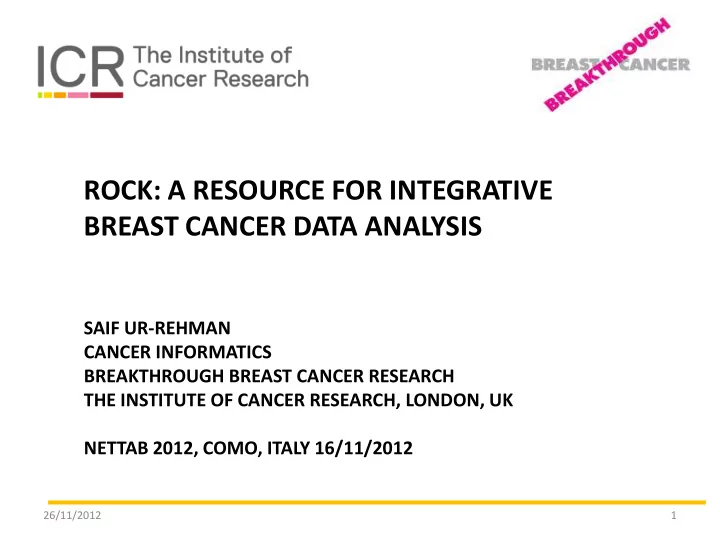

ROCK: A RESOURCE FOR INTEGRATIVE BREAST CANCER DATA ANALYSIS SAIF UR-REHMAN CANCER INFORMATICS BREAKTHROUGH BREAST CANCER RESEARCH THE INSTITUTE OF CANCER RESEARCH, LONDON, UK NETTAB 2012, COMO, ITALY 16/11/2012 26/11/2012 1
Breast Cancer • Breast cancer rates have increased by more than 50% over the last twenty years. • Breast cancer is now the most common cancer in the UK, with more than 46,000 women and 200 men diagnosed each year, and more than a million cases worldwide. • In the last decade numerous experimental approaches have been employed in an attempt to identify sub-types of breast cancer and new molecular targets for pharmaceutical interventions. 26/11/2012 2
Outline • Introduce issues surrounding breast cancer data integration. • Define ROCK as a response to some of these issues. • Illustrate the utility of ROCK via the use of case studies. 26/11/2012 3
Data Types • Clinical Annotation. • Gene expression. • DNA copy number. • DNA methylation. • Non-Coding RNA expression. • Protein expression. • Mutations/SNPs. 26/11/2012 4
Integration issues • Lack of consistency in sample classification schemes. • Mapping between data types e.g. gene to protein. 26/11/2012 5
ROCK • ROCK Online Cancer Knowledgebase. • Database containing the results of a large number of high throughput experiments on breast cancer. • Currently focussed on gene expression and DNA copy number. • Aimed primarily at bench scientists but is also utilised by bioinformaticians. • Available at rock.icr.ac.uk 26/11/2012 6
Aims of ROCK • To provide an integrative framework for breast cancer experimental data. • To provide functionality allowing bench scientists to use this functionality to test hypotheses in-silico in previously published datasets. 26/11/2012 7
Data in ROCK Gene Expression Studies: 84 aCGH Projects: 12 Gene Expression Platforms: 54 aCGH Platforms: 9 Analysed Gene Expression Projects: 63 aCGH Samples: 598 Gene Expression Analyses: 216 aCGH CNV Analyses: 40 Differentially Expressed Genes: 21862 aCGH CNVs: 2940 Gene Expression Samples: 7261 Total Genes in CNVs: 19974 Gene Expression Signatures: 38 26/11/2012 8
Additional data in ROCK • Data from the Cancer Genome Atlas (TCGA) • microRNA expression • Gene expression measured by NGS (RNASeq) • Human protein protein interaction data from HPRD, BioGrid, Mint (IMEX members) amongst others. 26/11/2012 9
oracle.jdbc.OracleConnection Tier 2: (Java) Tier 3: Data Tier 1: Application Logic Client Applications Tomcat Engine Web Browser Core Classes HTTP Servlets Rockscape JDBC JSPs SOAP CLADIST Other Applications XML Web Services API 26/11/2012 10
Analyze Analyze Aggregate 1 2 3 Protein GOA INTERPRO Rocks kscape cape OMIM Gene RGD Entrez CCDS UniGen e Experimental Expression Arrays PPI/Pathw aCGH RNAi Screens ay Data XML Web Services Sample Annotation Cladist ist API (SOAP) etc.
Sample Ontology • The sample is the fundamental data entity in ROCK. • All samples held in ROCK are classified within an ontological framework. • Allows comparisons of hypotheses between studies. • Represented in standard XML. • Samples can be stratified by up to three annotation terms. 26/11/2012 12
26/11/2012 13
Case Study 1: FZD7 • Frizzled 7 is a cell surface which is an initiating molecule for the Wnt signalling pathway. • Signalling pathways allow a cell to respond to its immediate environment. • Faulty Wnt signalling is indicated as possible cause of some breast cancers. 26/11/2012 14
Case Study 1: FZD7 (cont) • Recent work by Yang et al. has shown that FZD7 is upregulated in triple negative breast cancer. • Triple negative breast cancer is resistant to hormonal treatment and as such carries a comparatively poorer prognosis. • Yang L, Wu X, Wang Y, Zhang K, Wu J, Yuan YC, Deng X, Chen L, Kim CC, Lau S et al : FZD7 has a critical role in cell proliferation in triple negative breast cancer . Oncogene 2011, 30 (43):4437-4446. 26/11/2012 15
26/11/2012 16
26/11/2012 17
Microarray gene expression analyses • SAM (Significance of microarrays) • Correlation with known gene signatures for tumour/sample classification (PAM50). • Co-expression analyses. 26/11/2012 18
Case Study 2:MYC • MYC /c-MYC is a transcription factor which when over-expressed can drive cell proliferation. • Chromosomes are frequently altered in various cancer types. • It is possible to query ROCK as to whether the area of the chromosome containing MYC is altered in some studies. • MYC is located on the q arm of chromosome 8 on the forward strand between the hg19 genomic coordinates 128,747,680 and 128,753,674) 26/11/2012 19
26/11/2012 20
26/11/2012 21
Survival Analysis • ROCK also provides survival analysis. • Users can check if the expression level of a given gene is linked to a particular prognosis/outcome. • Only applicable in studies where survival data is known. 26/11/2012 22
Survival Analysis 26/11/2012 23
Iterative integration • ROCK links the results of all analyses. • This allows a user to undertake an iterative process where the results of one analysis are projected onto another. • Registered users can save gene lists within ROCK and use them as initiation points for subsequent analyses. 26/11/2012 24
GO/Pathway enrichment • Sets of genes retrieved via ROCK analyses can be examined for enrichment in GO terms as well as pathway membership. • KEGG • REACTOME 26/11/2012 25
Updates/Further Work • Additional data types being added. • Methylation/Epigenetic data • Protein expression data. • Other cancer types (Prostate/Ovarian) 26/11/2012 26
ROCK Mission • To provide an integrative framework for breast cancer experimental data. • To provide functionality allowing bench scientists to use this functionality to test hypotheses in-silico in previously published datasets. 26/11/2012 27
Acknowledgements Cancer Informatics team • Alice Gao • Costas Mitsopoulos • Jarle Hakas • Marketa Zvelebil Funding from Breakthrough Breast Cancer 26/11/2012 28
Thank you for your attention • Any questions? • Url: rock.icr.ac.uk 26/11/2012 29
Recommend
More recommend